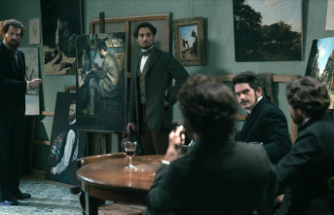"La Porte du vent" by Jean-Marc Souvira (Fleuve, 580 p., €22.90)
“Rudy stuck the 9mm to the policeman’s right ear […]. The explosion was deafening. " How did we get here ? After Les Sirènes noirs, the sixth thriller by divisional commissioner Jean-Marc Souvira, former head of the Central Office for the Suppression of Serious Financial Crime, will delight lovers of detective novels but also of history.
It is naturally a work of fiction, fascinating, nevertheless, warns the author, inspired by real events. Here it is: in France, the "Chinese clan" launders the money of the "Jewish clan". This "agreement" dates back to the period of the 1914 war, when more than 140,000 Chinese were welcomed into France, either to work in the factories in need of manpower, or to fight - the devouring front always more cannon fodder.
A century later, the two clans have copiously fattened themselves, on the basis of scams, frauds, scams, dubious financial arrangements thanks, in particular, to connections to tax havens... The Chinese laundering - for a fee - l money recovered by the Jews. A small company that does not know the crisis. But this beautiful cooperation will go wrong. Mafia laws cannot be broken. Otherwise, the consequences are terrible, violent and without appeal. Revenge only ends with murder.
Settlements of accounts and executions follow one another under the eyes of Commissioner Paul Dalmate, whom his hierarchy reproaches for his inaction in the face of the accumulation of deaths. In an attempt to stem the escalation of violence within the Jewish and Chinese communities, the two historic leaders of these mafias arrive in France, one from Jerusalem, the other from Beijing. These two old samurai, who are also friends, are in their respective countries at the helm of powerful criminal organizations with formidable international ramifications. For a meeting place, they choose a private room at the Hôtel de Crillon in Paris, their bodyguards posted outside. Will this summit meeting put an end to this fratricidal war? Not until they decide to take "those responsible for the mess to where it all started." So the police investigation led by Dalmate shifts towards the historical novel. Towards the origins, in an attempt to repair the present§ Jean-Louis Debré
"One day, my daughter disappeared in the night from my brain" by Stéphanie Kalfon (Verticals, 208 p., €18.50)
Emma's daughter disappears at a carnival on her 8th birthday. She is found, safe and sound, the next morning. She was not raped, she is not traumatized, she has nothing. Just a little girl who followed a cat, who got lost and was found sleeping not far away in a construction shack whose door she couldn't open. Yet Emma does not recognize her daughter. It's-not-his-daughter! A professor at the Beaux-Arts, she compares the patient education of a child to the work of a craftsman: he knows his every nook and cranny by heart, associated with struggles and discouragements, with outbursts, with discoveries, with reflections, with the rest that he will have taken here or there in the matter, with the relentlessness which will have kept him valiant in the vigils and the dawns. He and his work share a story that belongs to them. An intimacy. A tamper-proof bond. And there, she is formal, this little girl who was brought back to her is not her Nina! How this child manages to act so well she cannot tell, but one thing is certain: she is a usurper. A copy. Her hair ties are not the ones she had tied her pigtails with the night before. That mole in the middle of the forehead... It doesn't grow overnight, a mole, though! And that bruise on his knee... He was on the other side; she knows it, it was she who took care of her after her fall. And its size; his clothes don't fit anymore! And, as if by chance, she wants to stop the music whereas before she loved it. Nothing matches! The problem is that Emma is the only one to realize this. Paul, his companion, the father of the child, as well as the rest of the family take her for a madwoman. We believe her until the last page, and that's what's crazy. Personally, I thought of an abduction. And not only because I dreamed of one day having the opportunity to use this Anglicism in the criticism of a text of this quality… No, because I really believed in an abduction by dint of trying to understand How could one child be replaced by another. I had even come to doubt that I was reading a thriller§ Hannelore Cayre
"The Devoured" by Thibaut Solano (Robert Laffont, 350 p., €20.50)
Someone in a magazine that is very interested in the intimate lives of stars compared Thibaut Solano to Michael Connelly. Why not ? The transposition seems daring, however, when we follow the adventures of its hero, a news item journalist for the PQR - the regional daily press - who, after having raged in Poitiers in a newspaper that looked like La Nouvelle République, finds himself in Clermont- Ferrand at a rival of La Montagne, where Solano was a journalist. We had devoured Les Noyés du Clain, one of the best thrillers of the year 2021. We savored these Dévorés, one of the very good of the year 2023. We find Simon Magny there. It will remind old fans of the character of Sergueï Djerbitskine, alias Machin, invented by ADG in the 1970s and journalist for "La Nouvelle République du Val de Loire". A little clumsy, not very happy in love, average driver, lifting the bucket of regional red quite easily, a touch of bulging on the belt – in Clermont, home of Michelin, the belly tire as a pun does not even do anymore smile. In short, the antihero. You'd class him as average Frenchman or, as we say these days, "middle class" were it not for his stubborn character which would be ridiculous if it weren't for the luck factor and the flair of a Brittany Spaniel. Clermont-Ferrand in winter, Christmas Eve, dark days, low and heavy sky which weighs like a lid on the groaning spirit of the disillusioned reporter. In other words: "Don't talk to me about it, we're bored like dead rats," Bébert agreed, going to get a fifth glass from the closet. “It is battery before the sixth glass that we discover in the trunk of a Ford Fiesta the corpse of a rather massacred guy and deprived of his genital material. Then it is on Place de Jaude, towards the statue of Vercingetorix surrounded by the Christmas barracks, that a very excited father looks for his missing little girl. It snows, it blurs the tracks even in the brains. We have our idea. It's wrong: Solano knows how to set the bait perfectly. Don't look, you won't find. Put more wood on the fire and wait for the end§ Jacques Dupont
Douglas Stuart's "Mungo" (Globe, 480 p., €24)
Two pigeons loved each other with tender love… Morality, it was not a good idea. Especially in the Glasgow of the 1990s: a special friendship between two young boys, one Catholic and the other Protestant... A neighborhood of misery and violence, a lost mother who thinks she is single, with three children who are not really wanted: the eldest, gang leader who is reminiscent of Scorsese's Joe Pesci in Casino, in a teen version, and is called Hamish but has little to do with the deeply peaceful (without H) community of North America; the younger sister, Jodie, pregnant by her geo teacher, who has an abortion gypsy style; finally, the fragile Mungo, in love with the neighbor catho collector of pigeons, whom the mother entrusts to two deranged barely released from prison and condemned for sexual violence, with the aim of making a man of him. We shake all these harsh ingredients and out comes a very creepy thriller where violence nestles in every quarter of a page, where we dread the next one but can hardly let go. Especially since Douglas Stuart, who is not at his twisted trial, had already ruined the drone with Shuggie Bain, bestseller winner of the Booker Prize in 2020. And that he writes extremely well, this demon. Without wanting to spoil the sadistic pleasure of those who will risk accompanying Mungo on the banks of a loch in the company of two repeat offenders, let's reassure them all the same, it doesn't end too badly... or almost. The advantage with this Scottish devilry is that all our little daily annoyances and even the trains canceled because of strikes seem like a starling's rupee to us next to the black cumulus clouds hovering above poor Mungo§ J's head. .D.
Translated from English (Scotland) by Charles Bonnot.
"Small Disorders" by Christophe Guillaumot and Maïté Bernard (Liana Levi, 210 p., €18)
A cop shouldn't say that! Grégoire is a good police commander. He misses a little the time when the judicial police were installed on the Quai des Orfèvres, surrounded by the good little bistros that Jules Maigret frequented. There, in the new premises "caught between the ring road, the boulevards of the marshals, a recycling site...", the headquarters of the judicial police is certainly functional, very clean, but a little tasteless. Yes, Grégoire is a good cop, knowing informants and prostitutes, loved by his collaborators, who find nothing better for his 51 years than to offer him a sheep baptized Leibnitz. Then one day it goes wrong. He says too many words. He is tired of forms, Excel tables and the cancel culture that has become the rule even among the chickens responsible for teasing the mackerel. We even come to assess his degree of deconstruction as a patriarchal and non-racialized white man through an official quiz. Already at home his daughter considers him a redneck from Cabu...
A thriller pamphlet, very funny, co-written by a "house" who knows nothing of the new flaws of a police ripped off with ambient wokism. Behind the varnish, Courteline persists§ J. D.
Melania Avanzato - Paris 2022/SP – rancesca Mantovani/Gallimard/opale.photo – ©Astrid di Crollalanza/opale.photo – CLIVE SMITH/AFP – ©Eloise Martin/Leextra via opal.photo












